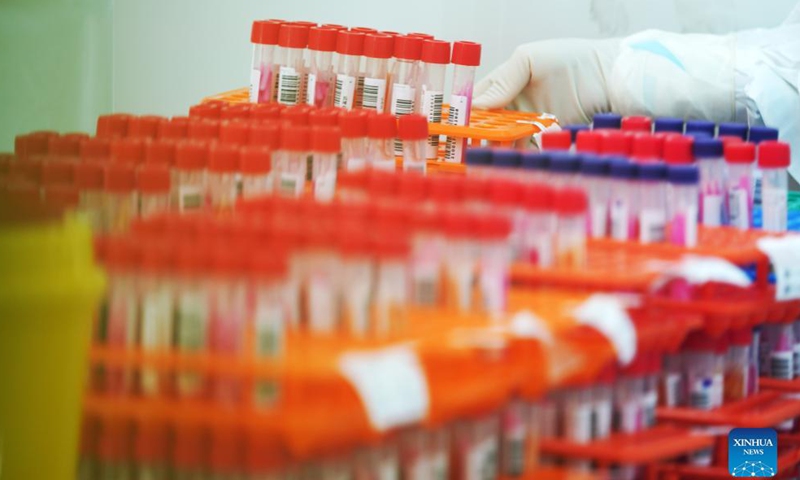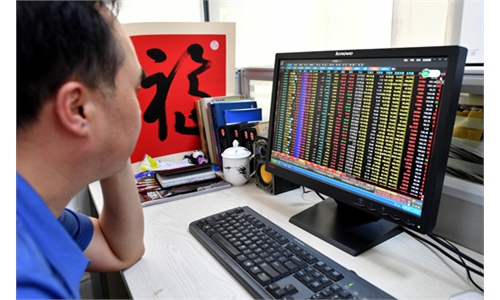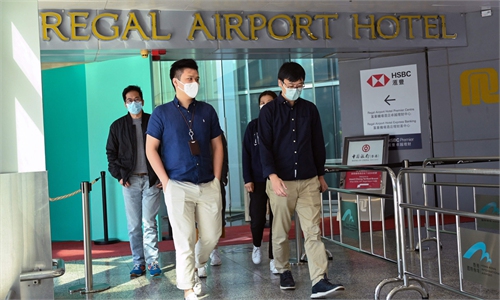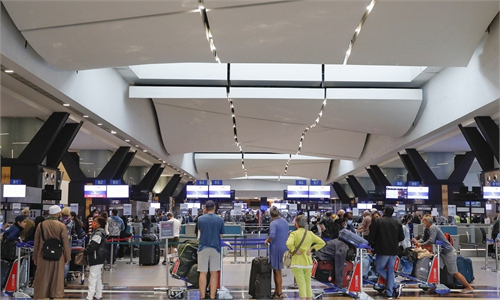
A medical worker works inside an air-inflated film chamber of a mobile laboratory for nucleic acid test in Harbin, northeast China's Heilongjiang Province, Nov. 5, 2021.Photo:Xinhua
Chinese nucleic acid test kit producers are ramping up efforts to provide nucleic acid tests that the world needs, with some seeing rising orders amid the sudden and unexpected outbreaks of Omicron, the mutant first reported in southern Africa.
The rapid spread of Omicron, which is reportedly more contagious than the other variants, led to the immediate suspension of international travel by up to 20 countries, targeting South Africa and its neighboring countries, as of Monday.
Chinese nucleic acid test makers are confident about the prevention and control of the new variant, saying that their self-developed products won't miss a single case of Omicron.
Several domestic nucleic acid test providers told the Global Times on Monday that their products are fully capable of tackling the new variant, and they are ready to meet growing market demand from both home and abroad.
A domestic testing kit manufacturing company called Sansure Biotech in Changsha, Central China's Hunan Province, told the Global Times on Monday that some countries are making inquiries, and they have been working overtime to ensure production and supply.
As soon as the new variant was reported, Sansure Biotech's experts urgently analyzed and compared the mutation site and the detection area with the company's existing products. They found that their product, the 2019-nCoV nucleic acid detection reagent using the PCR method, is able to deal with the new strain, a source with the company told the Global Times on Monday.
"With our testing product, there will be no missed cases or off-target situations for the variant," the person said, noting that they are ready to provide additional support for African countries in dealing with epidemic prevention needs.
Africa is one of the main cooperation areas of Sansure Biotech. Since 2020, the company has dispatched dozens of people to help Africa fight the pandemic, helping hundreds of laboratories in Ghana, Gabon and other African countries to achieve nucleic acid detection capabilities from scratch, according to the company.
Jiangsu Bioperfectus Technologies, another large test kit supplier, told the Global Times over the weekend that their testing kits are able to detect all variants.
"Our research and development division works to provide all diagnostic solutions and releases new products once it fulfills clinical and regulatory requirements," a person with Jiangsu Bioperfectus Technologies said, without disclosing any details about orders.
BGI, a domestic testing kit supplier, has completed a bioinformatics analysis of Omicron, and the results showed that the accuracy and sensitivity of the BGI kit for the detection of this variant strain will not be reduced, and there will be no missed target or missed detection.
This business confidence was reflected in stocks listed on the Science and Technology Innovation Board of the Shanghai Stock Exchange and ChiNext, which generally witnessed big jumps on Monday. Some industry players such as Jiangsu Bioperfectus Technologies and Liferiver Bio-Tech nearly hit the daily limits in early trading.
Omicron jumped into the headlines of almost all global leading media outlets over the weekend, as countries and regions such as the US, Canada and the EU issued travel restrictions on some southern African countries.
But domestic business representatives and experts dismissed concerns over the variant. There is absolutely no need to be worried when it comes to the nucleic acid test kits currently adopted in China, a senior expert on disease control and prevention told the Global Times on Monday.
Speaking to the Global Times on condition of anonymity, the expert said that polymerase chain reaction (PCR) tests, which detect genetic material from a specific organism such as a virus, can detect and screen for the presence of viruses. When it comes to the specific genotype, further gene sequencing is needed.
"But they [the type of strains] do not take much time to be detected - normally it takes less than 48 hours to measure the complete sequence," the expert said.
Tian Hongjian, a director with the China Medicinal Biotech Association, told the Global Times that China has great advantages in technology and production capacity in nucleic acid testing. While the testing efficiency varies depending on multiple factors, Tian said that the variant strains can be detected in the fastest 7-8 hours.



